Inside an old Walmart that’s growing, cooking and packing legal weed in New Jersey
READINGTON, New Jersey – I’m standing in the garden section of a Walmart, and I’m surrounded by hundreds of pounds of marijuana. The irony isn’t lost on me.
It’s packed and sealed in shipping boxes – hundreds of them – and sorted into individual piles for most of the legal weed dispensaries throughout the state.
It’s not actually a Walmart, at least not anymore. But you can still make out the sun-stained outline of the logo on a sign along Route 22, and you can feel the chill in the air as you walk into the one part of the building that’s not climate controlled – the warehouse section (ex-gardening section) of Verano Holdings’ cannabis farm-meets-kitchen-meets-factory-meets-distribution hub.
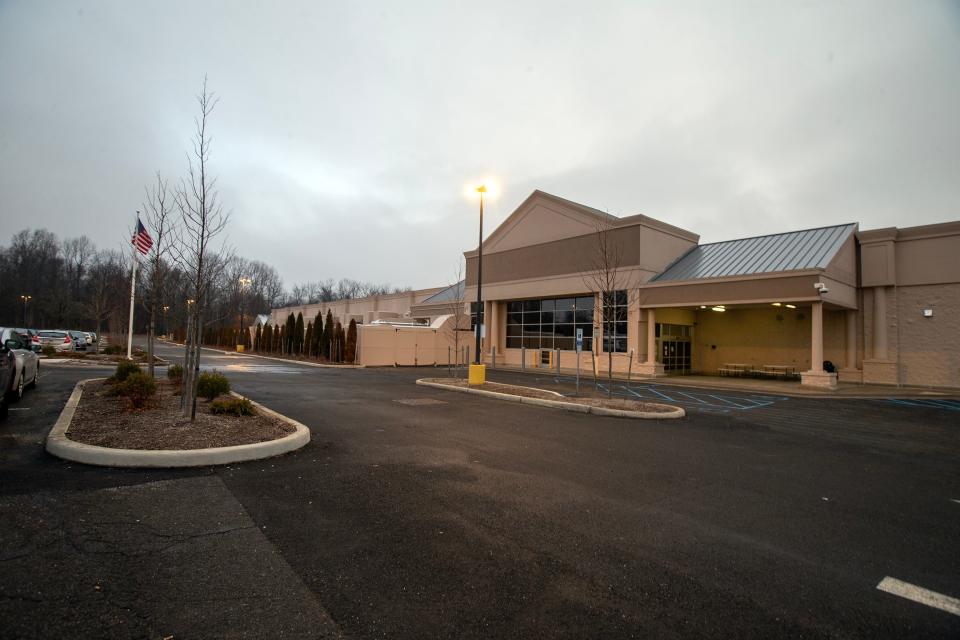
Verano, a Chicago-based cannabis company, closed on the vacant superstore for $9.1 million in December 2021. Since April 2020, it’s been operating what Chief Investment Officer Aaron Miles calls the “crown jewel” of its New Jersey operations.
When recreational marijuana sales first started last year, the facility ramped up production even more. Now, a little over 200 employees work at the Readington site.
"This is one of our show ponies," he said. "We're very proud of what we accomplished here. We feel that we're continuing to evolve our cultivation facilities, and we're proud to open our doors and show what we're capable of.
"This is a state-of-the-art facility, and it's only going to continue to get better."
Across these 120,000 square feet, an untold amount of marijuana is grown, manufactured and shipped out of here every year – and I mean “untold” literally. It’s a secret the company won’t disclose.
It’s not the only such center in New Jersey. There are only 12 other operators currently – legally – growing and manufacturing cannabis in New Jersey, so there’s a lot of sharing in spite of the competition.
Tomorrow, trucks will come and haul most of it to Verano’s Zen Leaf dispensaries in Neptune, Elizabeth and Lawrence. But there are also entire pallets labeled for Ascend Wellness in Montclair, RISE Dispensary in Paterson and even the month-old Valley Wellness dispensary in Raritan has a small pile of products to be shipped just eight miles away.
Even if the warehouse were to be emptied, it wouldn’t stay that way for long.
I just spent the last few hours looking at thousands of cannabis plants getting grown, picked, dried, harvested, weighed and sealed into packages by human and robotic hands alike.
Just like any gigantic superstore alongside a highway, this place will never run out of stock.
There’s always more where that came from. Much more.
‘Scratching the surface’
Up a short flight of steps, on top of a catwalk, is the biggest pile of weed I’ve ever seen.
It’s broken up into individual nuggets on top of what looks like a funnel, with a dozen or so smaller funnels underneath. The pile slowly gets smaller as buds are dropped into the funnel, down a chute and – without a sound – into a plastic jar.
Every so often, an employee wearing all-blue scrubs will pull a random jar and weigh it on a small scale in front of him. The magic number is 3.5 grams – an eighth-ounce of weed. If it’s more than 3.5 grams, the customer might be happy – but Verano won’t be. If it’s less than 3.5 grams, the customer won’t be happy – and Verano still won’t be happy.
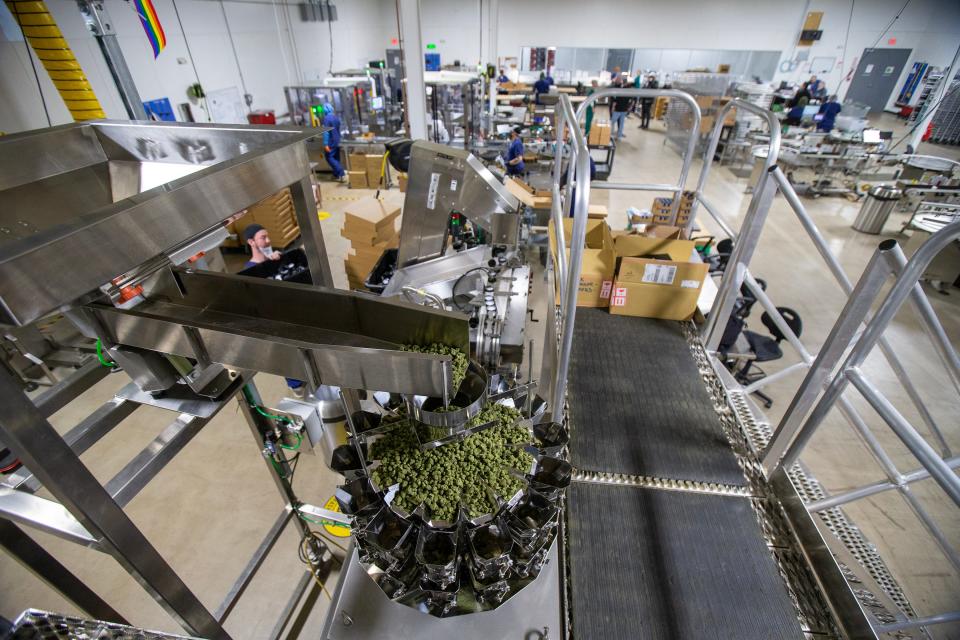
The conveyer belt pauses just long enough for the marijuana to drop into the jar, before it continues moving a few more feet into a second machine.
That machine attaches and seals a child-proof cap onto the jar, which is then fed down the conveyer belt to another machine that attaches a seed-to-sale label. That label spells out the entire history of a product for a consumer, including which mother plant it came from, when the clone was planted and it was harvested and packaged.
It's not just a convenient, customer-friendly service: It's required by law.
"We're just scratching the surface with what we're going to do here. You want to get automation down. You want to get the process down. You want to become as efficient as you can in these facilities," Miles said. "It opens a lot of eyes, when people walk through these facilities, to see that it is a fully-functioning cultivation facility that is continuing to improve."
The packaging room at Verano’s Readington facility is the final step before legal weed is shipped out to dispensaries across the state. It’s a full-on weed factory, a few dozen employees and the constant din of wall-to-wall machinery.
It’s a reminder that, while this entire process is still based solely around a plant, it’s still very much an industry. And like any other industry, the technology moves fast.
Consider your vape cartridges. When the facility began ramping up production in the days and weeks before the first adult use legal weed sales on April 21, 2022, employees were filling vape cartridges by hand. It’s a multi-step process – filling the cartridge with cannabis oil, capping it, sealing it and inspecting the final product for flaws.
After an hour, a few hundred vape cartridges would be ready to go.
Now? That entire process is completed by one machine, the Xylem-3. It fills and caps the vape cartridges and spits them into a tub below, like a penny pusher game at an arcade. In an hour, the machine can produce 1,000 to 1,200 cartridges, Miles said.
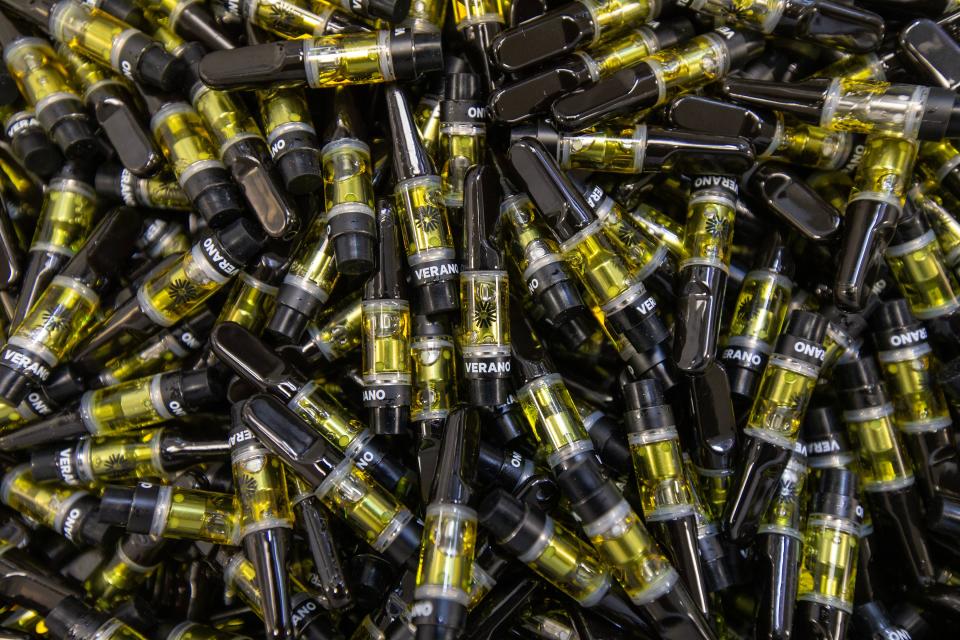
Compare that to the “shatter” table, just a few inches away. There, a half-dozen Verano employees are hand-measuring cannabis resin that is used for dabbing – quickly inhaling the very high-potency resin, usually through a bong, which produces a stronger and quicker high.
Though they work seriously and methodically, heads and tweezers moving in unison, it seems like a snail’s pace compared to the Xylem-3.
"You're trying to grow on a craft basis, where you maintain that consistency and quality – but now the quantity has to match the demand of the market," Miles said.
Verano COO Darren Weiss said the company measures efficiency by the number of human "touches" the product needs once it's fully cultivated. Even in some of the most automated loops, like pre-rolled joints or vape cartridges, humans are still involved. As the automation technology continues to advance, Weiss expects the number of touches is expected to decrease while overall efficiency goes up.
"Three years ago, if you walked into a facility like this, you'd see almost no automation," Weiss said. "It's really quite new."
That doesn't mean good, old-fashioned handiwork-with-human-hands is necessarily a bad thing. In fact, Verano charges more money for it.
As of Jan. 13, an eighth-ounce of cannabis sealed into a jar by a machine – their “Essence” line of products – cost $50.
But an eighth-ounce of "Reserve" flower, even the same strain, costs $10 more. The only difference? The buds are individually picked out and weighed by hand before they're placed in the jar.
It's a reminder that despite all the technology and automation surrounding the cannabis industry, you still can't replicate the human touch.
At least, not yet.
‘The first cut’
They call it the “kitchen,” but really it seems more like a chemistry lab. Not even a real chemistry lab, mind you – the kind of chemistry lab you imagine when you’re a kid. I’d half-expect Bunsen and Beaker from the Muppets to pop out from behind a corner.
There’s a constantly revolving, ball-shaped beaker with a mysterious brown-ish liquid inside. A series of tubes, twisted like crazy straws, connects it to a bigger tank with even more tubes protruding from it. And they’re all working at once, like a weird, scientific symphony.
At the center of it all is Charlotte Pizzuto, the 24-year-old laboratory manager of Verano’s New Jersey manufacturing facility. But everyone really just calls her the “mad scientist.”
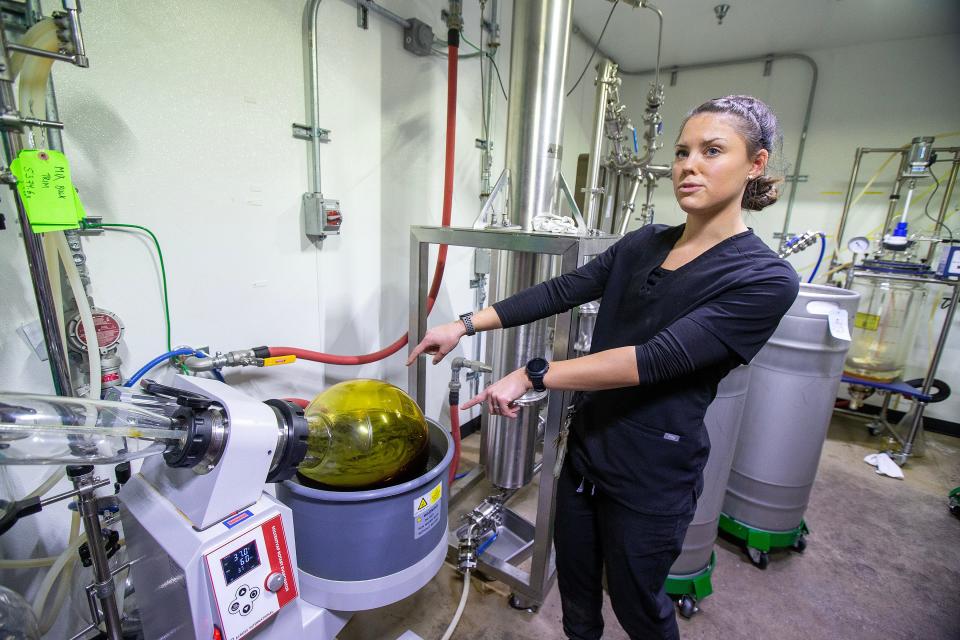
This is the industrial version of your friend’s kitchen where they make edibles. When it enters the Verano kitchen, it’s a dried-out, ground-up plant. When it leaves a few days later, it's as a semi-translucent oil that looks a shade darker than any other cooking oil – it’s even stored in Ball mason jars. (Of course, if you ate even a tablespoon of it, you’d probably be down for the count.)
What happens in between is where the science comes into play.
First, the plant goes through an extraction process – often with ethanol. Or, as Pizzuto put it: "You take big bags of weed, throw them in here," she said, pointing toward a large vat, "and wash it with 30 gallons of ethanol."
The ethanol extracts all of the nutrients out of the plant – like cannabinoids and terpenes – before the whole thing is decarboxylated, which is a fancy word for "heated like an oven." The heat both evaporates the ethanol away and activates the tetrahydrocannabinol, the psychoactive component of marijuana. That heat is crucial: It's the difference between eating raw cannabis and smoking a joint or placing a pot brownie in the oven.
What's left is what the cannabis industry usually refers to as “crude oil.” It’s a fitting name, as the liquid looks dark and thick to the naked eye.
Then, the distillation process begins: The oil is heated to the lowest boiling point possible – a specific temperature that employees like Pizzuto have determined is the perfect temperature to separate specific kinds of cannabinoids. That’s how you get a product with a high potency of CBD, for example, or one with a higher concentration of terpenes, another psychoactive component in cannabis.
But the oil isn’t purified on the first pass. It takes numerous passes over a day or two, with each one rendering the oil lighter and lighter, until it’s mason jar-worthy.
In most other legal weed states, that oil goes onto many forms. In New Jersey, it's only a handful.
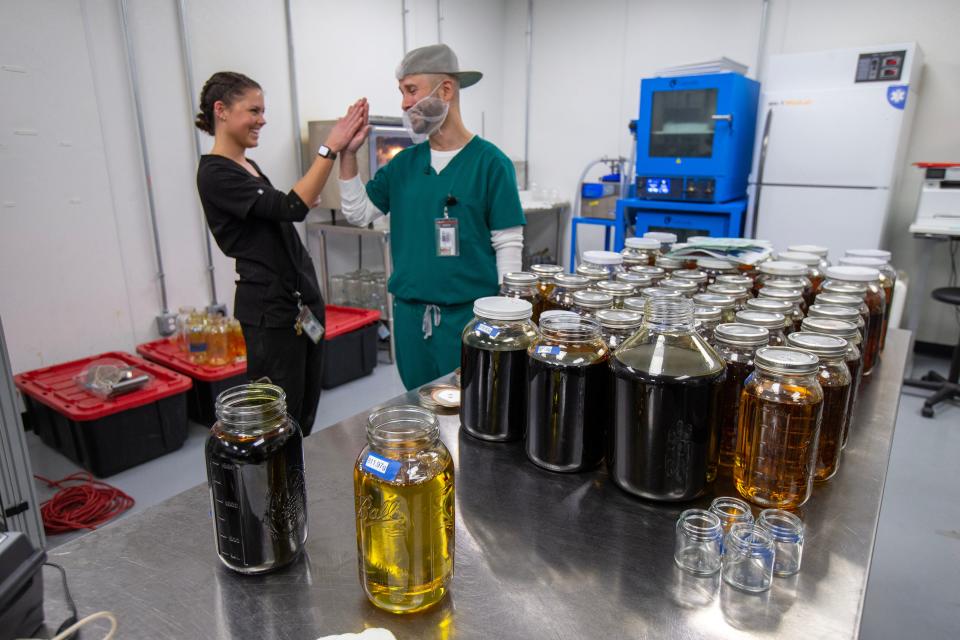
While I was visiting the site, a machine squirted thickened globs of oil into a small, pink tray with a few dozen indents. Before long, they would be cooked and turned into “Bits,” Verano’s new low-dose edible designed for “indulging without overdoing it.”
It's one of only a few edible options available in New Jersey. At Verano’s Zen Leaf dispensary in Neptune, your options are mints (20 for $20), dissolvable or chewable tablets (10 for $30) and the soft lozenges, about $30 to $35 for a pack of 10.
It looks like a gummy candy, but it’s not. Not technically. Not legally.
To put it in context: Four years ago, I was sent on a week-long reporting trip to Denver to try and get a sense of what “legal weed” would look like in New Jersey. The dispensaries we visited, for the most part, looked like neighborhood stores – albeit with far more security.
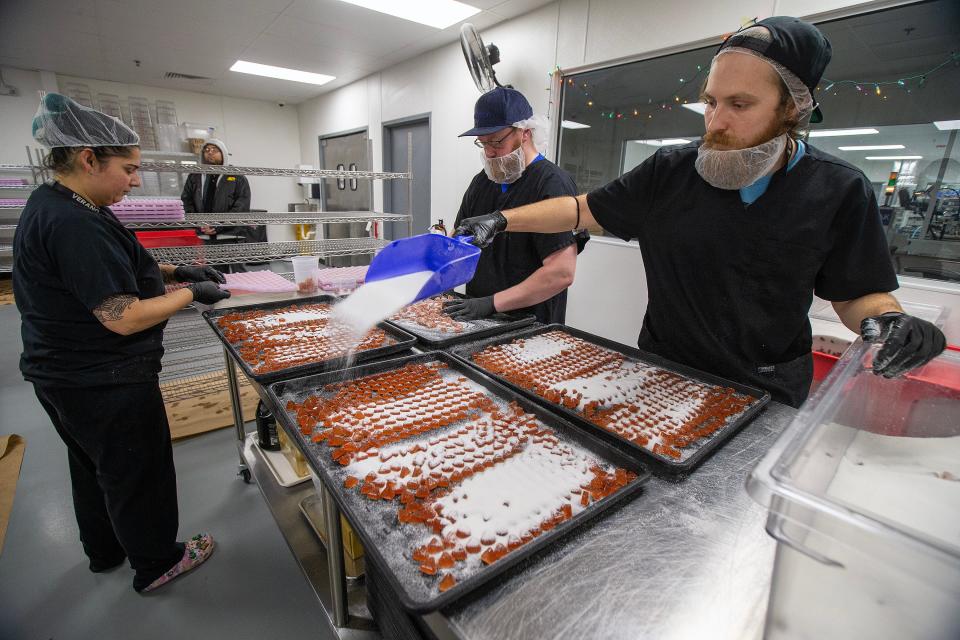
There are strict packaging and labeling laws on edible cannabis products, but any adult would almost immediately realize it was weed. There were cookies. There were brownies. There weren’t just chocolate bars – there was a whole variety of chocolate bars, like walking down the candy aisle of a Wawa.
This is the world of cannabis regulation in New Jersey. Under the marijuana legalization laws enacted by Gov. Phil Murphy in Feb. 2022, dispensaries are prohibited from selling any cannabis products “resembling food.” Regulations adopted by the New Jersey Cannabis Regulatory Commission specifically cover “syrups, pills, tablets, capsules and chewable forms” – with the rest prohibited.
At the time, CRC Executive Director Jeff Brown said other edibles manufactured in a “kitchen environment” required more nuanced rules, since perishable products are involved.
“That’s not to say we won’t in the future but, as of right now, we’re starting out with just the addition of some things like concentrates. This is just the first cut,” he said.
It's an untapped market, but the Verano facility in Readington was built with the whole thing in mind, including chocolate and baked goods.
"We built our kitchen with the ability to produce the full suite of products we have in other markets," Weiss said. "We put a request into the state of New Jersey to let us produce chocolates. They've been sitting on it for two and a half years."
According to cannabis industry analysis firm Headset, edibles accounted for nearly 12% of all cannabis sales in 11 states last year, nearly $1.6 billion – up from about $1.4 billion and $1.1 billion in 2020.
Nearly three-quarters of all sales are gummies, though their market share slightly dipped from 2021 to 2022, while chocolates and caramels and other chews slightly grew.
The main difference: In other states, gummies are called gummies. The first time I heard the term "soft lozenge," I had to look up what it meant.
‘The challenging part’
Three billion dollars.
That’s the highest estimate I could find of just how big the New Jersey cannabis industry could get – as much as $2.9 billion, according to cannabis industry analytics firm Headset.
It’s a big number, but it’s hard to put in context what that actually looks like. The New Jersey budget is nearly $51 billion, so it’s not as big as that. But it’s more than an entire baseball team sold for just a few years ago (the New York Mets, for $2.4 billion).
And then, I walked into one of the “bloom rooms” at the not-a-Walmart.
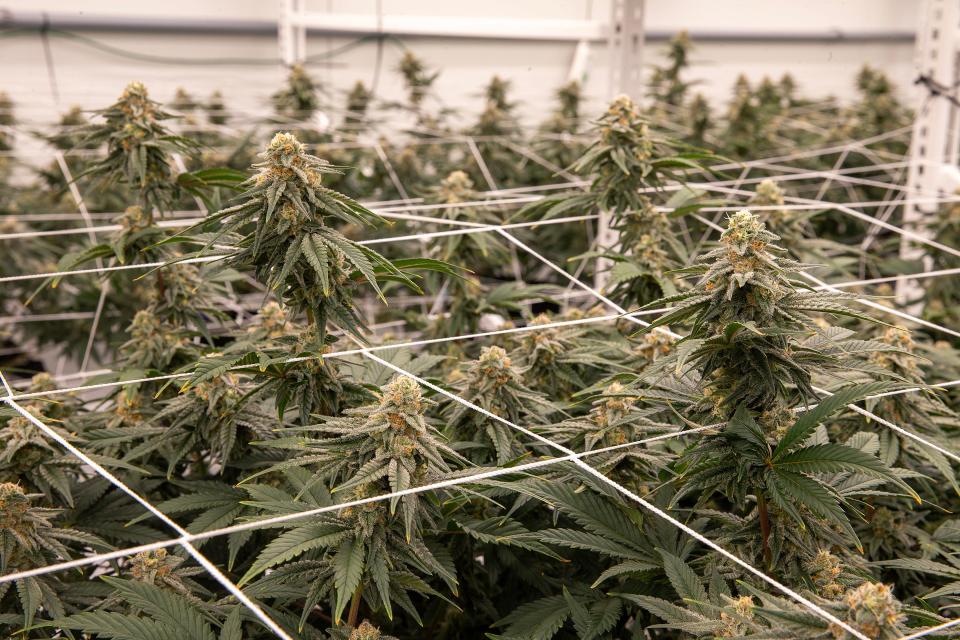
There are three dozen, fully-matured, four-foot-tall plants in individual pots, cordoned off into smaller sections. That framework is repeated a few times on either side and then stretch all the way back as far as I can see. And they’re stacked so high I can’t even see the top, three shelves high.
I do some quick visual math and count about 1,200 cannabis plants.
“That’s a lot of plants,” I said.
“There are 16 rooms,” replied Oscar Cabeza, cultivation director at the Verano facility. One such room is 20,000 square feet in and of itself – that’s big enough to qualify for a microbusiness cultivation license on its own.
That’s a lot of plants. That’s a lot of money.
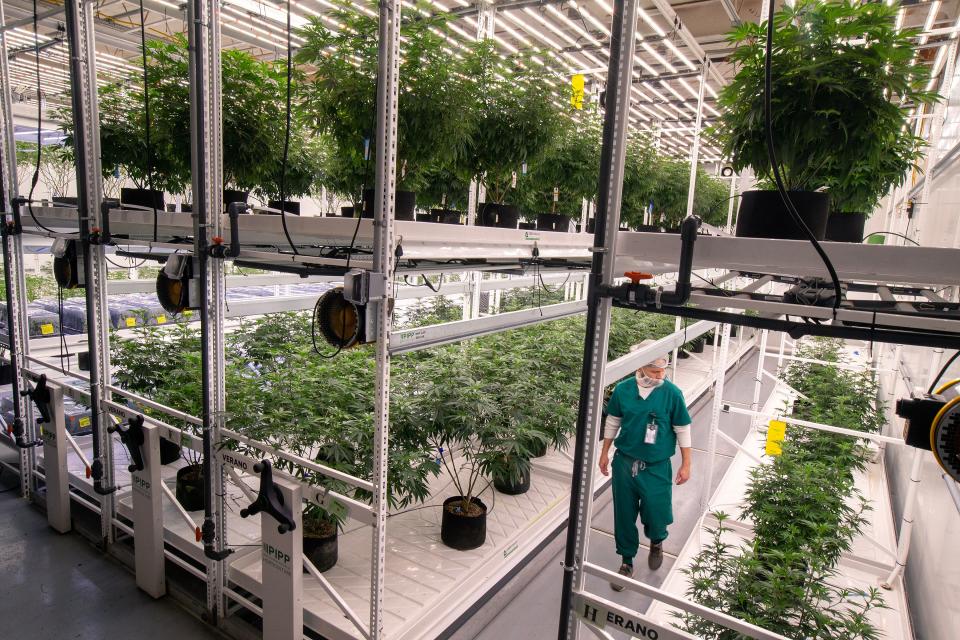
Cabeza, 43, has been working in weed for the bulk of his adult life – but only legally for the last decade or so. A New York native, Cabeza came to Verano from the "legacy" market – a term preferred by the cannabis industry for the black market.
He used to think the 800-square-foot cultivation site he worked in was huge. Now, he does something like 40,000 steps per day walking around the Verano facility in Readington. He's everywhere. Everyone knows him. Following him around the halls, kitchens, labs and factories at the Readington facility feels like being led around by the most popular kid in high school.
"It's been a fun ride, seeing it from one perspective and going into the other. The level, the scale has been exponential," Cabeza said. "The challenging part isn't growing the plants, it's the people – cultivating the culture, trying to minimize the learning curve and getting them all on the same page."
The grow rooms in Readington seem to show a fusion of those cultures. It's undoubtedly a commercial, almost industrial, agricultural operation. But whenever a room seems a little too sterile, there's something to catch your eye.
In one room, four-inch cannabis clones are clipped from their four-foot-tall "mother" plants and stored in what looks unmistakably like the container from a grocery store rotisserie chicken. They'll stay there for two weeks, with the tips of their leaves clipped to promote "generative growth," Cabeza said. It keeps the plant growing vertically, not horizontally, and gives it some growing pains to build up strength.
"At this facility, nothing starts from seed," Cabeza said. "Everything starts from clone."
There are little sticky notes attached to each container with the strain name – Indian Landrace, Space Mintz, Funnelcake. Some of them have small doodles, like a little drawing of a scooter or a Skee-Ball game.
This is New Jersey weed, after all.
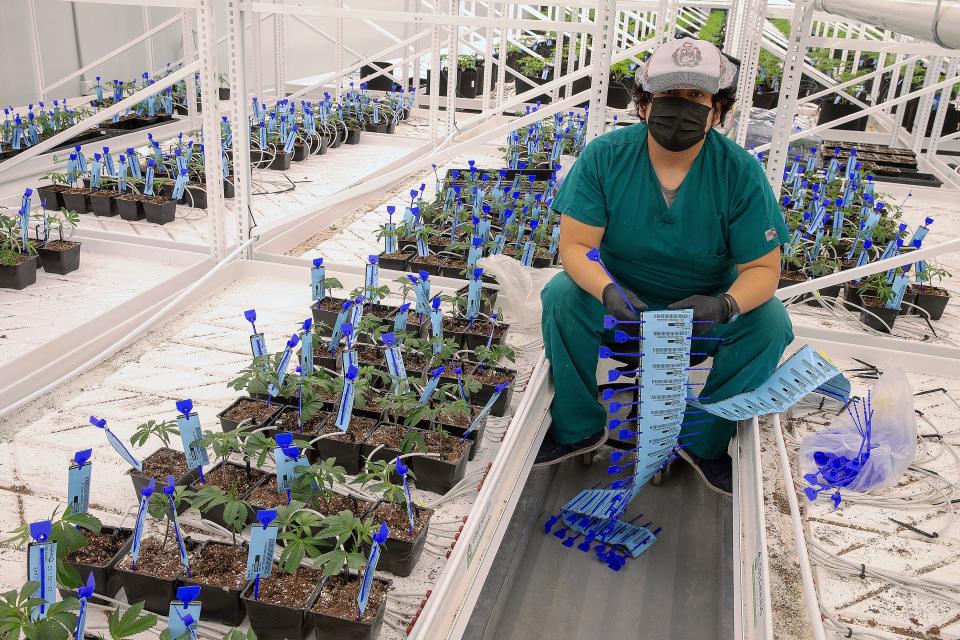
Once the clones outgrow the plastic containers, they're transferred to other pots as they continue to grow before moving onto the bloom room, where they start to flower.
It's the bulk of the cultivation time, about eight to nine weeks, Cabeza said. But it’s with good reason: The flower is what you’re interested in. The plants spend 12 hours every day in bright lights and the other 12 hours in darkness, which pushes the plant to begin producing buds.
Walking around the bloom room, I could see the growth. Some of the buds were smaller and had more of a pine tree green color, shaped like small Brussel sprouts. Others were big and bulky and a lighter, drier green color, even starting to crystallize with what looked like light snow or even glitter.
It’s easy to forget sometimes that this is really, at its core, an agricultural industry.
After they’re fully flowered, the plants are hung out to dry –upside down – for anywhere from 11 to 14 days, depending on the strain, Cabeza said. There are scientific, high-tech ways to know when a specific plant is dry enough.
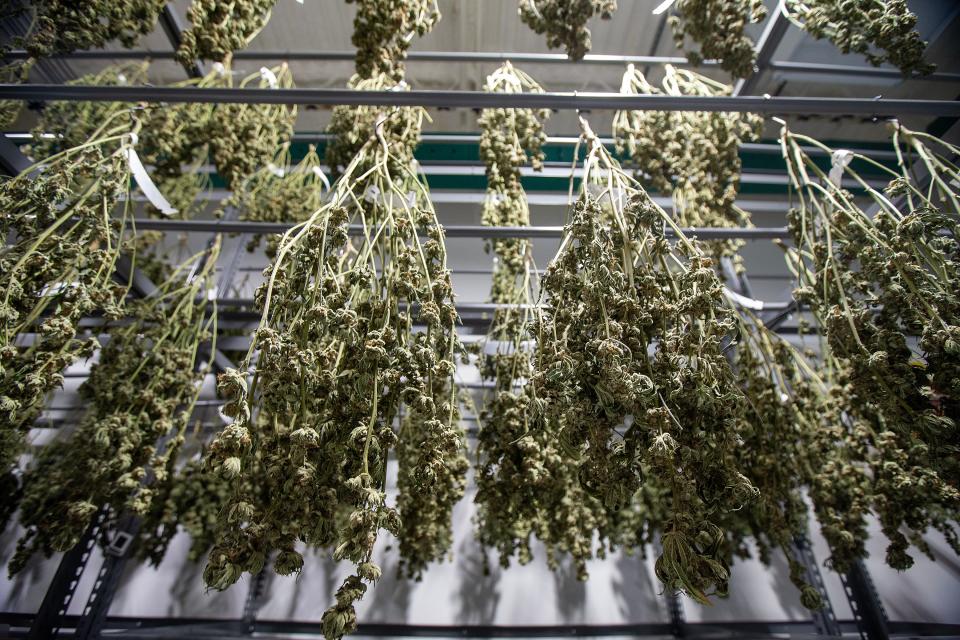
And then there’s what Cabeza simply calls “bro science”: Does the stem snap like a twig, for example?
Once they’re fully dry, they’re harvested by both hand and by machine – the hand-cut cannabis costs a little more – and stored in tubs to cure for as long as three weeks.
Every day, Verano staffers "burp" the cannabis, shaking and sifting through it to let the gas and any residual moisture scape, Cabeza said.
Walking into the curing room, he offered to shake around a few tubs and let me take a whiff. I don’t smoke weed, but even I could smell the difference – one tub with an acidic, citrus flavor, another with the more classic “skunk” odor.
It smells like money.
Mike Davis has spent the last decade covering New Jersey local news, marijuana legalization, transportation and a little bit of everything else. He's won a couple of awards that make his parents very proud. Contact him at mdavis@gannettnj.com or @byMikeDavis on Twitter.
This article originally appeared on USA TODAY: New Jersey legal weed: Inside the old Walmart where cannabis is grown

